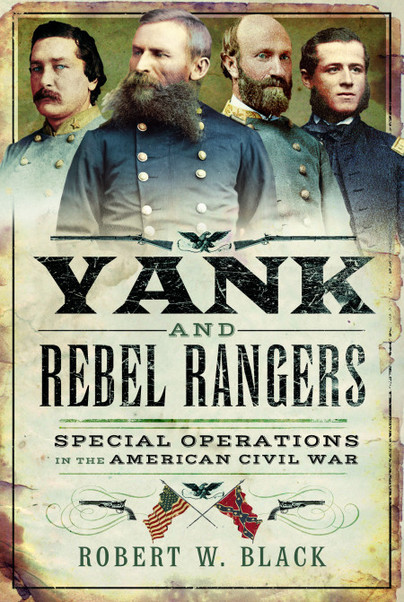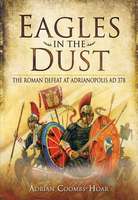Yank and Rebel Rangers (ePub)
Special Operations in the American Civil War
Imprint: Pen & Sword Military
File Size: 2.5 MB (.epub)
Illustrations: 8 black and white illustrations
ISBN: 9781526744456
Published: 3rd April 2019
| Other formats available | Price |
|---|---|
| Yank and Rebel Rangers Paperback Add to Basket | £14.99 |
The American internal war of 1861-65 was not civil. Those fighting for the Union called it the “War of the Rebellion” while the Confederacy viewed it as the “War of Yankee Aggression” or the “Second War of Independence”. Armies fought great, sweeping battles over vast distances and are well recorded – Antietam, Shiloh, Fredericksburg, Gettysburg - but in the seams of the battlefield another, and much less known or publicized war raged. Both the Union and the Confederacy employed small forces of bold and highly motivated soldiers for special operations behind enemy lines. Skilled in infiltration – sometimes disguising themselves as rural mail carriers - these warriors deftly scouted deep into enemy territory, captured important personnel, disrupted lines of communication and logistics, and sowed confusion and fear. Often wearing the uniform of the enemy, they faced execution as spies if captured. Despite these risks, and in part because of them, these warriors fought and died as American rangers.
Overall this is an interesting book that looks at the less familiar Ranger and partisan units of the Civil War, giving some idea of how widespread they were and how much impact they could have on the fighting.
History of War
The term Ranger conjures a vision of today’s highly trained and
Military Images Magazine, Spring 2021
disciplined military forces capable of clandestine strikes deep
into enemy territory. Students of the Civil War will recall the
names and faces of wily, audacious Confederate commanders,
such as Turner Ashby, Harry Gilmor, “Hanse” McNeill, Elijah
V. White and John D. Imboden.
Profiles of these rebel leaders are among those featured in author
Robert W. Black’s well-crafted monograph, Yank and Rebel Rangers:
Special Operations in the American Civil War. The volume is published
by Sword & Pen Military, a division of Sword & Pen Books, a U.K.
company with a focus on military history and militaria.
Black, a decorated U.S. Army Ranger colonel who fought in
Korea and Vietnam, has studied the history of Rangers in a series of
authoritative books. In this effort to capture the essence of a Ranger
during the Civil War, he excels in providing definition and context.
Black’s preface and two-part introduction span the origins of the
Rangers in Britain and the
American colonies in the 17th
century to the military and
cultural background during the
Civil War. “Terrain is the workplace of the Ranger,” Black notes
in discussing the rough country
in which the Rangers operated.
Black also observes that many
Union-loyal subjects believed
ambushing—a classic military
tactic well used by Rangers—an
unjust method: “In America it
was a tactic routinely employed
by both Indians and whites from
their early encounters.”
What follows are profiles of
13 Ranger organizations on the
Southern side, including rebels
who participated in the raid on
St. Albans, Vt., and the plot to
burn New York City. Fascinating
reading here. Black also examines
10 Union organizations, among
them Henry Harrison Young’s
men and Sheridan’s Scouts.
If you’re looking for John
Singleton Mosby, John Hunt
Morgan and Nathan Bedford Forrest, they are not to be found here.
Black defines them and their commands as irregular forces, and directs
readers to consult his 2008 book, Ghost, Thunderbolt, and Wizard:
Mosby, Morgan, and Forrest in the Civil War.
Yank and Rebel Rangers is illustrated with 14 soldier portraits
ranging from often-reproduced generals to a few lesser knowns. This
is not a photo book, but a compendium of Civil War Rangers. Pick
up a copy in print or digital—you’ll come away a more informed and
better student of the Civil War.
"...an exciting read, full of daring feats and romantic rides through enemy lines..."
Marine Corps History
"Black makes no value judgments concerning any of these partisan groups. Instead, each is presented clearly and without prejudice—let the readers make up their own minds about the moral implications of the actions of these groups and individuals."
Civil War Book Review
"I recommend Yanks and Rebel Rangers to anyone interested in partisan warfare in general and Civil War partisans specifically."
Civil War Book Review's Summer 2021
Overall, the book is an excellent overview, and in many instances entertaining, of the evolution of the Rangers during the American Civil War. Readers having a special operations background or interest, as well as Civil War buffs, will be rewarded by reading this book.
Battles and Book Reviews
Read the full review here
As featured by
America's Civil War magazine, January 2020
This book details an aspect of the Civil War that is often neglected. It engages the reader with numerous anecdotal accounts, some quite humorous, in addition to the large-scale narrative of Ranger activity during the Civil War.
The Journal of America’s Military Past
Reveals the wideranging use of rangers by both sides. It is exhaustively researched and well written. The author presents gripping accounts of the various exploits of these unusual soldiers
Military Heritage
As featured on Civil War Books and Authors
Civil War Books and Authors
As featured by
VaeVictis - n° 144 - mars/avril 2019
Black (The Battalion), a veteran of the U.S. Army Rangers, extrapolates a lineage of the special forces group back to the American Civil War in this accessible history. The book focuses primarily on those who led Confederate units that performed missions behind the lines of conventional armies, harassing and impeding operations, such as Confederate cavalry commander Turner Ashby, whose forces stopped trains and blew up a canal dam. Black describes how these operations were organized, planned, and executed, and how they caused problems for more conventional commanders. The author stretches the term “ranger” further than most historians would condone (including both conventional cavalry, on the one hand, and guerilla fighters, on the other—and even the Blackhawk service of future president Abraham Lincoln). But this entertaining book’s tales of unconventional Civil War adventure will appeal to the general reader.
Publisher Weekly
The term Special Forces has come to encompass all highly trained special operations units from the British Commandos in 1940, but Special Forces go back through history to the ancient civilizations and were an important element during the American Civil War. – Very Highly Recommended
Firetrench
Read the full review here
It would be expected that given the sometimes informal territorial boundaries and the absence of a language barrier, the American Civil War would be fertile ground for covert operations. This book describes the talented men who dared to go behind enemy lines for reconnaissance and disruption. It is a thoroughly good read.
Michael McCarthy
Michael McCarthy. Battlefield Guide
About Col Robert W Black
Colonel Robert W. Black is a decorated US Army Ranger who fought in the Korean and Vietnam Wars. Originally assigned to the 82nd Airborne, Black volunteered for the 8th Airborne Ranger Company and served as a Browning Automatic Rifle gunner in Korea.
In 1966 he was assigned to Military Advisory Command, Vietnam (MACV). Together with his Korean War experience Colonel Black saw combat actions in eight campaigns. Twice awarded the Combat Infantryman Badge, he holds the Silver Star, three Bronze Stars (two for valor), the Legion of Merit, the Air Medal, the Joint Service Commendation Medal, two Army Commendation Medals, the Vietnam Cross of Gallantry, and the Vietnam Cross of Honor.
Colonel Black has written several books on Rangers including - The Battalion: The Dramatic Story of the 2nd Ranger Battalion in WWII; The Ranger Force: Darby's Rangers in World War II; Rangers in World War II; Rangers in Korea
Battle of Antietam [Battle of Sharpsburg]
17th September 1862
Bloodiest day in the American Civil War: 22,000 dead, wounded or missing in first battle on Union soil















